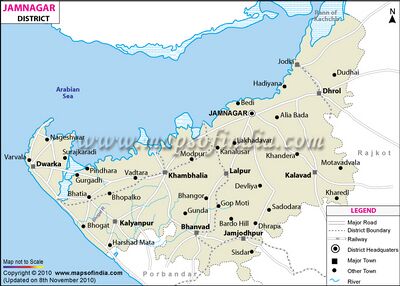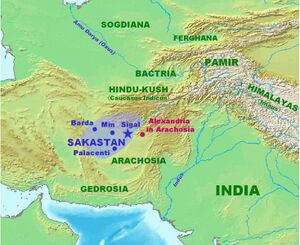Barda Hill

Barda (बरड़ा) or Bardo (बरड़ो) is name of a hill in Jamnagar district of Gujarat.
Location
Barado Hill is located in north of Jamjodhpur near southern border of the district.
History
Sir H. M. Elliot and John Dowson[1] write that about the year 140 H. (758 AD), the Khalif Al Mansúr appointed Hashám to Sind, who conquered countries which had hitherto resisted the progress of the Muhammadan arms. He despatched 'Amrú bin Jamal with a fleet of barks to the coast of Barada, against which point, we are informed by Tabarí and Ibn Asír, another expedition was despatched in 160 H., in which, though the Arabs succeeded in taking the town, sickness swept away a great portion of the troops, while they were stationed in an Indian port, and the rest, on their return, were shipwrecked on the coast of Persia; so that the Khalif Mahdí was deterred from any further attempts upon India.
A body of troops, at the time when 'Amrú was employed against Barada, penetrated into "the kingdom of Hind, conquered the country of Kashmír, and took many women and children captive."3 The whole province of Multán was also reduced. At Kandábel, there was a party of Arabs, whom Hashám expelled the country. They are suspected, with some reason, to have been adherents of 'Alí.
Jat clans
Hijra 160. A.D. 776. — Conquest of the town of Barada
Sir H. M. Elliot[2] writes: In the year 159 (A.D. 775), Al Mahdi sent an army by sea under 'Abdu-l Malik bin Shahdbu-l Musamma'i to India. The force consisted of a large number of troops and volunteers, among whom was Al Rabi' bin Subaih. They proceeded on their way and at length disembarked at Barada. When they reached the place they laid siege to it. The people of the neighbourhood fought with them frequently. The town was reduced to extremities, and God prevailed over it in the same year. The people were forbidden to worship the Budd, which the Muhammadans burned. Some of the people were burned, the rest were slain, and twenty Musulmans perished in testimony of their faith. God came to them, and raised the sea against them, so they waited until the weather should be favourable. Disease then fell upon them, and about a thousand of them died, among whom was Rabi' bin Subaih. They then returned homewards and reached the coast of Persia, in what is called the Bahru-l Hamrán. There the wind rose in the night time and wrecked their vessels. Some were drowned, and some escaped.
Barda city in Parthian Stations

Parthian Stations by Isidore of Charax, is an account of the overland trade route between the Levant and India, in the 1st century BCE, The Greek text with a translation and commentary by Wilfred H. Schoff. Transcribed from the Original London Edition, 1914. This record mentions about city named Barda. Burdaks are probably associated with city called Barda, the place is the royal residence of the Sakas in Sistan. The presence of the Sakas in Sakastan in the 1st century BCE is mentioned by Isidore of Charax in his "Parthian stations". He explained that they were bordered at that time by Greek cities to the east (Alexandria of the Caucasus and Alexandria of the Arachosians), and the Parthian-controlled territory of Arachosia to the south:
- "Beyond is Sacastana of the Scythian Sacae, which is also Paraetacena, 63 schoeni. There are the city of Barda and the city of Min and the city of Palacenti and the city of Sigal (Cf. Nimrus of the Rustam story in the Shah Nama); in that place is the royal residence of the Sacae; and nearby is the city of Alexandria (and nearby is the city of Alexandropolis), and six villages." Parthian stations, 18.[3]
Barada in Orissa
Barada and Barado named villages are in Cuttack (कटक) (also known as Kataka district in in Orissa.
External links
See also
References
- ↑ The History of India, as Told by Its Own Historians/Note (B).- Historical,p.444
- ↑ The history of India : as told by its own historians. Volume II/VI. Kamilu-t Tawarikh of Ibn Asir, by Sir H. M. Elliot Edited by John Dowson, 1867, p.246
- ↑ Parthian stations
Back to Jat Monuments

